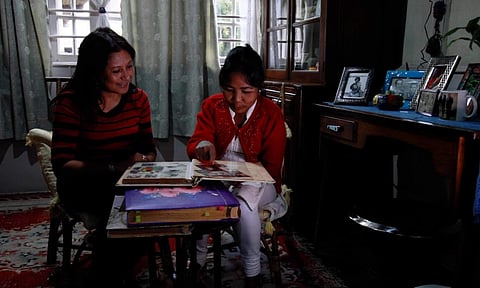

Miriam Chandy Menacherry’s new documentary, From The Shadows, begins quite fittingly with fleeting images of shadow play and some searing statistics from the National Crime Records Bureau. That 108234 children went missing in India in 2020 and that every 8 minutes a girl disappears. Menacherry throws light on this urgent issue by travelling along the Northeastern borders to discover, research, record and document the shocking stories of some of these missing girls, the heinous acts of child trafficking and the struggles of activists who have decided to devote their lives to fighting the cases and getting justice for the survivors.
There’s artiste-activist Leena Kejriwal’s Missing Link Trust and the Missing Art Project that has been involved in creating and strengthening awareness in society through a graffiti campaign involving silhouettes of young girls painted on the city walls and other public spaces. She calls these the representations of Black Holes that “millions of girls are disappearing into”. This#missinggirl shadow imagery keeps reappearing as a leitmotif throughout the film.
The documentary reveals how these disappearances are aligned with another social evil: child marriage. In several cases, the young girls get lured—often by family members, neighbours, or acquaintances—to the brothels while running away from enforced marriages at home. Then there is the familiar promise of a good job that never materializes. In other cases, they are sold by poor parents in the villages for just a few thousand rupees while they get traded in lakhs later in the cities.
“Sisterhood of survivors and stories of resilience”, is one way to describe the film. The personal story of one such girl, Samina (name changed), supported by Leena, runs like a thread through the film, lending it the crucial narrative spine and propulsion as we move from her initial resolve to fight till the end to niggling fears of being quietened down with an acid attack to getting frustrated with non-cooperation from police and betrayal from a colleague to entirely losing faith in the system intent on derailing her case. Yet she soldiers on, a prolonged interruption due to COVID notwithstanding, with Leena by her side.
“It has taken a very long 6 years to complete this film, partly because of the pandemic and partly because of a gruelling court case we follow in the film with so many twists and turns that affected how we continued to tell the story and represent the survivor fighting the legal battle. We spent a lot of additional time in post-production just to ensure we can show this film in India as well as internationally respecting the strict laws that govern cases of sexual violence,” writes Menacherry.
She covers the subject in an intensive, focused, comprehensive and gentle way in which primacy and respect, appropriately so, are given to the survivor. The film comes up from only that which they want to share and whether they want to reveal their identity and names or not. Some, like Samina, despite the back to the camera, are chillingly candid and matter-of-fact in recalling details of the abuse and violence that only make things
On the other hand, is the open book like life of the gently defiant Ella Sangma, who secured a rare landmark conviction, despite threats and bribes, against the “powerful owner of almost half the brothels of GB Road in Delhi” with the help of activist Hasina Kharbhih founder of Impulse NGO Network. Even a car accident involving Hasina, (whom she calls “a signal of the power” of their adversary) in which her driver died, didn’t stop them from the pursuit of justice.
Hasina, who has worked with over 70000 survivors, exposes the trafficking nexus as she helps repatriate cross-border trafficking survivors. The documentary cov
To mark International Women’s Day on March 8, the film, produced and shot by a majority female creative team and crew, had its North American premiere at a special screening on March 9 in Austin that was presented by Film Independent’s Global Media Makers in collaboration with South Asian House of SXSW (South By Southwest Festival) as a lead into the festival.